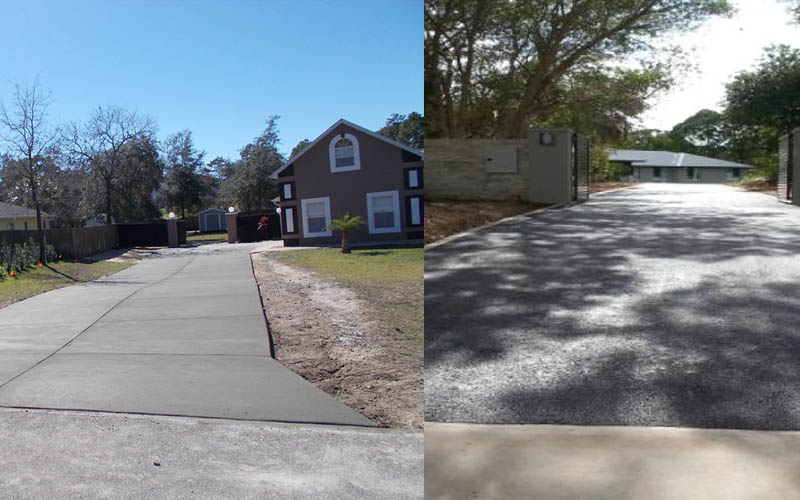Is your current driveway cracked or showing signs of wear and tear? Are you looking to replace your driveway but feel unsure which material is best for your home? Below you will find a list of factors to consider when selecting a material for your new driveway. Concrete and asphalt both offer great advantages and characteristics, though your specific location and preferences will determine which material will work best for you.
What Is The Difference Between Concrete and Asphalt?
While these two materials seem similar and have a similar composition, there are some vast differences between these two mixtures. Both are applied in a similar manner and are made up of a mixture containing stone and sand but the main difference is found in the adhesive used to create the pouring mixture. In concrete, the adhesive used is cement, while in asphalt the adhesive is tar. Both work at providing a strong and durable surface but have different characteristics and resistances to different elements.
Consider The Climate of Your Area
First, one of the most important factors to consider when selecting a driveway material is your location and the typical climate of your area. In Houston, Texas, the summers are known to be extremely hot while winters can fluctuate between mild and comfortable. The best material for temperature resistance is concrete, making the material a great choice for warmer climates. On the other hand, concrete does not do well in colder climates and may crack or become damaged easier. Asphalt does a great job at withstanding cold temperatures but is known to become sticky and compromised in severe heat. Considering the climate of your home is very important when selecting a material for your driveway.
Great Longevity With Both Materials
One of the major benefits of choosing between these two materials is that both options provide excellent longevity and dependability over a long period of time. This type of material is designed to be permanent and long-lasting when installed, so you won’t have to worry about replacing materials after just a year or two of use. There are slight differences in the lifespan of these two materials, with concrete driveways lasting around 35 years and asphalt lasting for around 25. Both provide exceptional longevity but the choice of materials will ultimately depend on your personal preferences.
Weigh Material and Installation Costs
It can be difficult to determine exactly how much a new driveway will cost without taking into consideration factors like your location, desired materials, and what company you select to complete the installation. On average, you can expect a concrete driveway to be more expensive than an asphalt option, with a difference of around $2 per square foot. With the most common costs for asphalt installation falling around $2.20 per square foot, homeowners can expect to spend around $4.30 per square foot. Many people are quick to opt for the cheaper choice but this is not always the best option in the long run.
Consider Repairs and Maintenance Costs
It’s important to also consider the maintenance and common repairs for the material you choose to make you comfortable with the long-term commitments. Both asphalt and concrete are susceptible to damages like cracking but on average, asphalt is known to break down quicker due to its soft consistency. However, it’s important to note that while asphalt may break down, it is incredibly easy and affordable to repair, which can help prolong the longevity of your driveway. Concrete is stronger and more apt to last longer, though if it does get damaged it can be difficult to repair. It’s common for homeowners to resurface the entire driveway if the concrete is damaged.
Design Elements May Be Limited
If you are looking to boost your home’s curb appeal or have your driveway match the aesthetic of your home, it’s important to consider the design limitations of each material. If you choose asphalt, your driveway will be limited in color options to just dark gray or black. There is little option for individuality, though the appearance is sleek and elegant. With concrete, the standard color is light gray but there are countless design options available to customize your driveway. Concrete is easy to stain or add a stamped design, which can really boost your curb appeal and help to create an inviting space!
Consider Houston’s Hot Temperatures
As discussed previously, for homeowners in the Houston, Texas area it is very important to consider the summer temperatures before choosing a driveway material. Concrete is great at standing up against heat and humidity but can be difficult to repair if damaged. Asphalt does not do the best in hot temperatures but is easy to patch if the material is compromised. Some important questions to consider are whether your driveway is in direct sunlight, your specific climate, and what material will work best for you.
Contact A Licensed Company For Assistance
It’s clear that installing a new driveway can be challenging when you live in an area with high temperatures or severe climates. It can make it difficult to select a material or to know what your options are for design and customization. Be sure to reach out to a company like Driveway Replacement Houston for assistance with driveway installation. The team of experts can help address any of your questions or concerns regarding concrete and asphalt.

